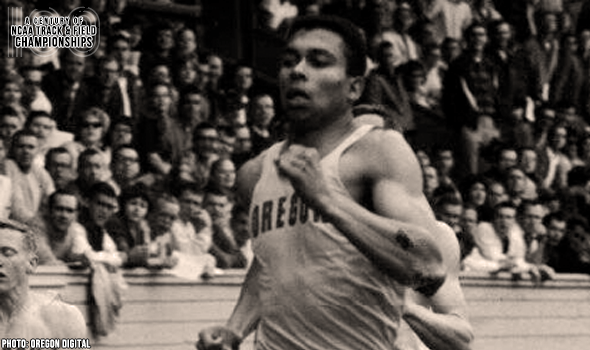
Oregon’s Jerome Sprinted To NCAA Glory
If ever a meet could have used photo-finish timing, it was the 1964 NCAA Outdoor Track & Field Championships.
The 5000 and 400 were both ruled deadlocks, but those were with merely two runners inseparable.
The 100-meter final saw three sprinters crossing the line at almost the same instant: Harry Jerome of Oregon, Edwin Roberts of North Carolina Central and Trenton Jackson of Illinois.
It took almost an hour to sort the finish, but when they did, Jerome was ruled the victor in 10.1. Roberts (second) and Jackson (third) were also credited with that same mark as well.
“Honestly, that’s one I’d hate to judge on,” Jerome said about the finish to Dick Leutzinger of the Eugene Register-Guard. “Usually I know when I win or lose. I’d hate to say on that one.”
While the 10.1 was a meet and collegiate record, it wasn’t a PR for Jerome. He still owned a share of the world record of 10.0 that he set in the summer after his freshman season back in 1960.
Jerome was a Canadian prodigy who came from great lineage. As a high school standout in North Vancouver, British Columbia, he broke a 31-year-old national record in the 220 yards. And many knew his grandfather, John Armstrong Howard, who was the first Black athlete to represent Canada in the Olympic Games.
The fact that Jerome was even running in 1964 – near his best, let alone at all – was a comeback story for the ages. Jerome tore his quadriceps tendon in the fall of 1962 at the British Commonwealth Games and the seriousness of the injury led many to believe that he would never run again. He didn’t believe that and a little over a year later, he opened the 1964 season by equaling the world indoor best in the 60-yard dash with his time of 6.0.
Then at the 1964 NCAA Championships, Jerome doubled back in the 200, taking third to lead Oregon to its second team title in three years – both at Hayward Field. The Ducks won their first national title in 1962 when Jerome won the 220 yards and was runner-up in the 100.
Not long after that, Jerome went to the Tokyo Olympic Games, where he earned his lone Olympic medal – a bronze in the 100.
Jerome died in 1982 of a brain aneurysm at age 42. In 1984, the Labatts Classic held in Burnaby was renamed the Harry Jerome Classic and in 1988 a statue of him was erected in Vancouver’s Stanley Park.
The NCAA and collegiate track & field will mark a momentous milestone in the spring of 2021 -- the 100th anniversary of the NCAA Championships and with that, the NCAA Track & Field Championships. In June 1921, the University of Chicago hosted the first track & field championships in NCAA history.
This point can’t be emphasized enough: Not only was the event the first for NCAA track & field, but the first championships for any sport under the sponsorship of the NCAA.
To celebrate, over each of the next 365 days, the U.S. Track & Field and Cross Country Coaches Association (USTFCCCA) will celebrate moments, student-athletes, and coaches that have made a century’s worth of championships special. From humble beginnings to important historical milestones to the modern-day, collegiate track & field has evolved with the American society.
The 2021 edition of the NCAA Division I Outdoor Track & Field Championships begin with preliminary round action on May 27-29 in Jacksonville, Fla., and College Station, Texas. The championships final site and culmination of the celebration is slated for June 9-12, 2021 at the newly rebuilt Hayward Field in Eugene, Ore.

Bakewell’s Winding Road To 800 Meter Glory
Karen Bakewell set a meet record of 2:00.85 in the Women’s 800 Meters at the 1986 NCAA Division I Outdoor Track & Field Championships.

Hurdling History For Forrest “Spec” Towns
Forrest “Spec” Towns won back-to-back hurdling titles at the 1936 and 1937 NCAA Outdoor Track & Field Championships as part of a legendary streak.

What A Finish In The 1500 Meters!
Yared Nuguse of Notre Dame beat Justine Kiprotich of Michigan State by 0.003 seconds for the 1500-meter title at the 2019 NCAA Division I Outdoor Track & Field Championships.

UCLA’s Griffith Sprinted Into History
Florence Griffith won two career individual titles at the NCAA Division I Outdoor Track & Field Championships, which included a meet record in the 400 Meters.

Ewell Made Quite The (Penn) State-ment
Barney Ewell of Penn State completed the 100-200 double twice at the NCAA Outdoor Championships in 1940 and 1941.

Unique Discus History For Oerter In 1958
Al Oerter won back-to-back discus titles at the NCAA Outdoor Track & Field Championships, which included the only tie in meet history back in 1958.

Indiana State’s Hyche Swept Sprints In 1993
No athlete – male or female – has won more individual career sprint titles at the NCAA Division I Track & Field Championships than Holli Hyche of Indiana State!

Dendy’s Double-Double Put Him Among Greats
Marquis Dendy of Florida pulled off the double-double in the long jump & triple jump at the NCAA Division I Outdoor Track & Field Championships in 2014 and 2015.

SMU’s Ezeh Hammered Out Greatness
Florence Ezeh is the only woman in the history of the NCAA Division I Outdoor Track & Field Championships to win three hammer throw titles in a career.

Gehrmann Starred In The Mile/1500
Don Gehrmann of Wisconsin won three consecutive 1500/mile titles at the NCAA Outdoor Track & Field Championships between 1948 and 1950!

